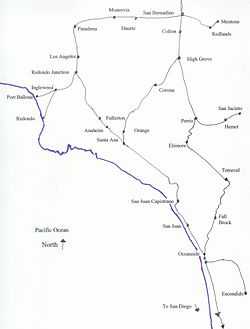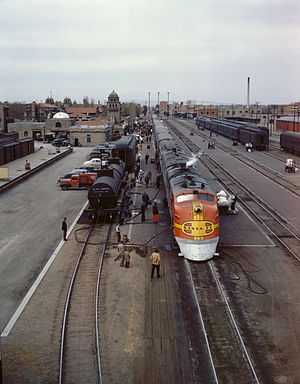Redondo Junction, California
Coordinates: 34°1′13″N 118°13′29″W / 34.02028°N 118.22472°W
'Redondo Junction, California" is the site of the current Amtrak maintenance facility. It is located 3.5 miles south of the Union Station (Los Angeles) passenger Terminal, Southwest of Boyle Heights near Washington Boulevard and the Los Angeles River.
Redondo Junction services Amtrak's long distance trains: Southwest Chief, Coast Starlight, Desert Wind and Sunset Limited. Also the regional train the Pacific Surfliner.
- The Redondo Junction train wreck on January 22, 1956 was a deadly wreck involving the Santa Fe RDCs. It was the first major disaster in the LA area covered on live television,[1] and the worst train wreck in the city's history.[2] The train comprised two RDCs (Budd Rail Diesel Cars) which ran two return trips daily on the San Diegan (train numbers 80-83) between the more conventional streamliners.
History

The California Central Railway built and ran a line from Port Ballona (what is now Playa del Rey, Los Angeles) to Redondo Junction the line opened Sept. 1887. The line ran 13 miles. Redondo Junction became a major maintenance facility for trains.[3] California Central Railway also ran a line from Redondo Junction to Los Angeles-La Grande Station. The Redondo Beach Railway also connected to Redondo Junction. The Redondo Beach Railway was incorporated in April 1888, Henry E. Huntington controlled and owned much of the Redondo Beach Railway. Redondo Beach Railway line started operation Sept. 1, 1888. California Central Railway operated, but did not own, the 11 miles of the Redondo Beach Railway. This line ran from Redondo Beach to Inglewood, California. In 1890, the Hotel Redondo opened, the rail line help make Redondo "The Place" for tourists. First train on April 16, 1888, from Inglewood the line continued to downtown LA on California Central Railway tracks through the Redondo Junction. California Central Railway completed a line started by the San Bernardino and San Diego Railway the line ran from Redondo Junction to Orange and continued to Anaheim, San Juan Capistrano and then to Oceanside then to San Diego. The Pacific Surfliner still runs on this line from San Diego to Santa Ana.
- On Nov. 7, 1889 California Central Railway was consolidated into Southern California Railway Company. On June 30, 1888, it started operation as a subsidiary of the Atchison, Topeka and Santa Fe Railway. In 1914 Santa Fe built Redondo Junction a 25 track roundhouse to service trains. The railway turntable was a 120-foot through plate girder design.[4]


- The Redondo Junction was sold to Amtrak in January 1977. In May 1999, Amtrak built new train service facility just north of the original 1914 roundhouse. The 1914 roundhouse was demolished in August 2000 to make space for a future servicing area. The railway turntable is still on the site.[5]
See also
- Junction (rail)
- List of California railroads
- History of rail transportation in California
- Southern Transcon
- Pacific Electric's Red Cars that connected with the rail lines.
- Santa Fe 3751
References
- ↑ http://wikimapia.org/9945366/Santa-Fe-Derailment-Redondo-Junction-site Santa Fe Derailment: Redondo Junction
- ↑ http://www.lafdmuseum.org/santa-fe-train-wreck Santa Fe Train Wreck
- ↑ wikimapia.org, Amtrak Redondo Junction Maintenance Facility
- ↑ rypn.org, Thoughts on Preservation, by Bob Yarger
- ↑ http://atsf.railfan.net Amtrak site, Some Santa Fe Roundhouses, (with photos of Redondo Junction)
- Bad Night at Redondo Junction, By Loren B. Joplin from the Los Angeles Fire Department Historical Archive
- ICC Report No.3675
- Santa Fe Budd RDC-1 DC-191 preserved
- Poor's 1889 Page 993
- 1888 California PUC report Page 119
- Railroads of San Bernardino County, California
- Annual Report of the Board of Railroad Commissioners of the State California, Volume 9 By Board of Railroad Commissioners of the State of California, page 84
- California Southern Railway History
- California History, VOLUME LXVII NO. 1-4 1988, CONTENTS, California Historical Society SAN FRANCISCO • LOS ANGELES • SAN MARINO, NUMBER 1— MARCH 1988